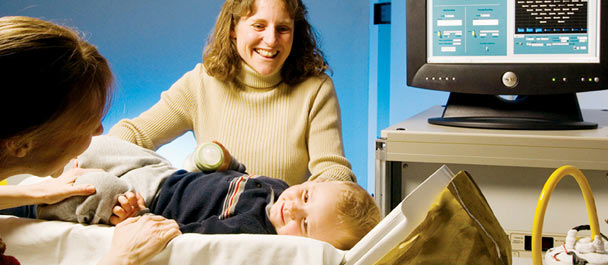
Scientific Lectures //
Language processing in real-time: neural underpinnings and implications for communication disorders
Who: Bob McMurray- Associate Professor in the Departments of Psychology, Communication Sciences and Disorders & Interdisciplinary Program in Neuroscience at the University of Iowa
Presented: June 19, 2014
A critical property of spoken language is that it unfolds over time. At any given moment, listeners do not have all of the relevant information they need to recognize words; rather, they accumulate information over time and continuously compare the accumulated input to thousands of similar words in the mental lexicon. In this talk, I present a series of behavioral studies using newly developed eye-tracking methods that allow us to precisely characterize which words a listener consider, millisecond-by-millisecond during word recognition. They suggest that the process of word recognition is characterized by competition between similar sounding words that unfolds over several hundred milliseconds to enable accurate speech recognition. I then present work using electro-corticography to measure brain activity in awake, behaving epilepsy patients to understand the neural basis of this competition. Using complex classifier methods I show that competition dynamics can be observed in very early auditory cortical areas including Heschl’s gyrus and the superior temporal gyrus. Finally, I discuss recent eye-tracking work on children with specific language impairment, and children and adults who use cochlear implants, which demonstrate that sensory and language deficits have unique effects on the timecourse of processing, even as both show similar deficits in overall accuracy. As a whole, this suggests that language is not a static set of knowledge or a simple ability to be measured; rather it is a continuously unfolding dynamic process.
Bob McMurray earned a B.A. in Psychology from Cornell University, and a Ph.D. in Brain and Cognitive Sciences from the University of Rochester. He is currently an Associate Professor of Psychology, Linguistics and Communication Sciences and Disorders at the University of Iowa. His research examines speech perception, language acquisition, learning and reading in typical children and adults, a variety of clinical populations and occasionally animal models. He investigates these questions with behavioral methods, cognitive neuroscience and computational modeling.
To view presentation please click here.

